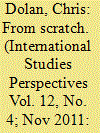| Srl | Item |
| 1 |
ID:
107983


|
|
|
|
|
| Publication |
2011.
|
| Summary/Abstract |
This article advances a blueprint for small colleges interested in implementing new international studies programs. In response to a call from its strategic plan, the faculty at Lebanon Valley College (LVC) recently approved an IS program with two concentrations (international affairs and comparative culture) emphasizing core and advanced elective courses, foreign language, study abroad, as well as undergraduate research, and internship experiences. This article frames the undergraduate international studies program within the broader context of the prevailing literature and identifies the potential advantages and drawbacks of initiating and directing the major and minor. It then provides a brief discussion of the ways in which the program can be assessed and a general overview of the career opportunities available to majors. The article concludes by recommending that small colleges like LVC have the potential to prepare students for the responsibilities of global citizenship when international studies programs are designed to incorporate and maximize college-wide strengths.
|
|
|
|
|
|
|
|
|
|
|
|
|
|
|
|
| 2 |
ID:
169461


|
|
|
|
|
| Summary/Abstract |
Despite living in a nuclear-weapon state, young Americans are generally ill-informed about weapons of mass destruction (WMD) and their means of control. The result is both widespread apathy toward nonproliferation and disarmament decision making among the general public and a looming personnel crisis within government sectors that enact policy in these domains. Considering that 67 percent of high school graduates in the United States go on to pursue a bachelor’s degree, exposing more undergraduates to nonproliferation and disarmament issues could contribute to addressing both of these challenges. The present study analyzes how these issues are already being taught at select US colleges and universities and explores ways to introduce them to more students that align with current priorities in higher education, such as interdisciplinary learning, digital humanities, and data-science learning. It also proposes concrete steps that the WMD policy community can take to help institutions of higher education integrate these topics more broadly into their curricula. The anticipated result is greater support for education in this important issue area across different stakeholders in academia, as well as increased engagement with these critical issues among a more diverse population of young people.
|
|
|
|
|
|
|
|
|
|
|
|
|
|
|
|